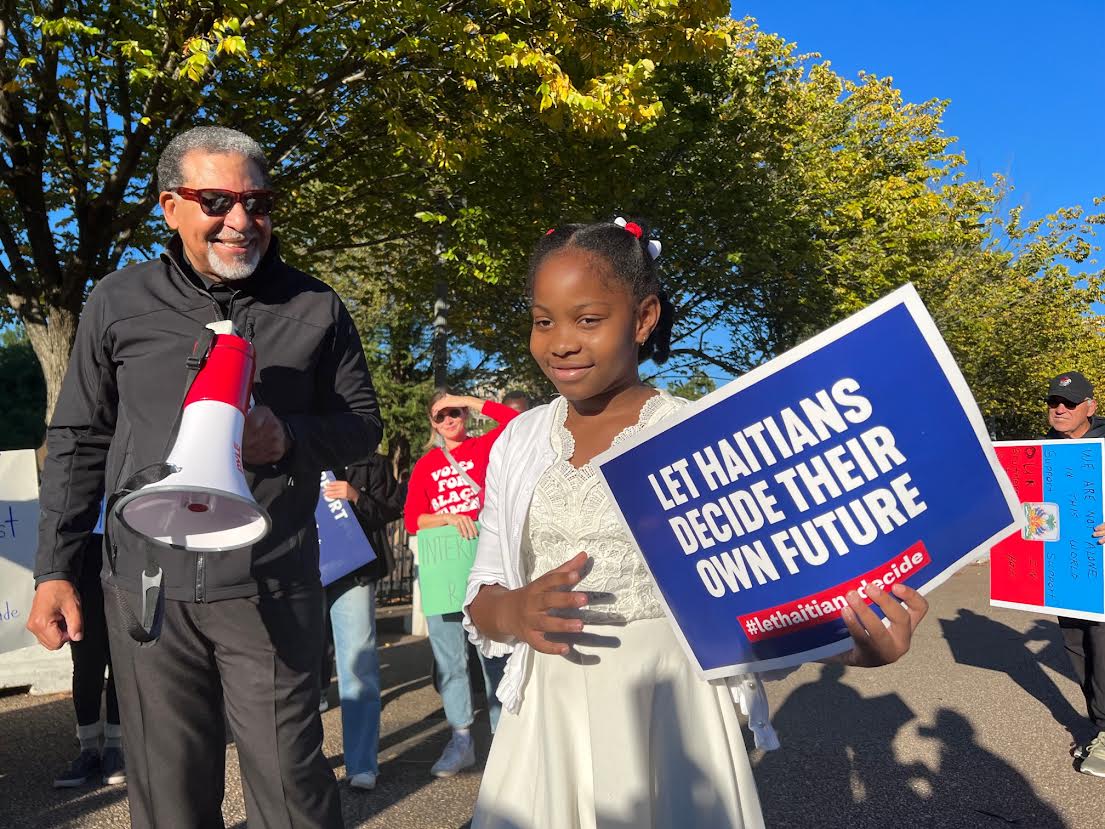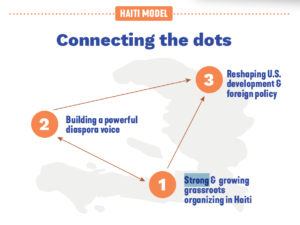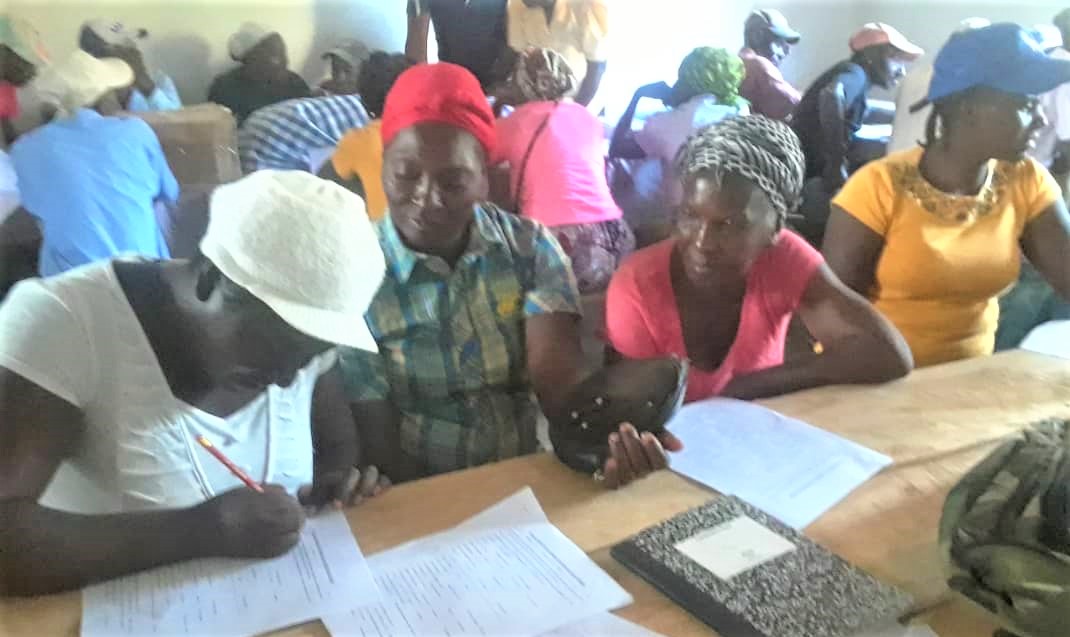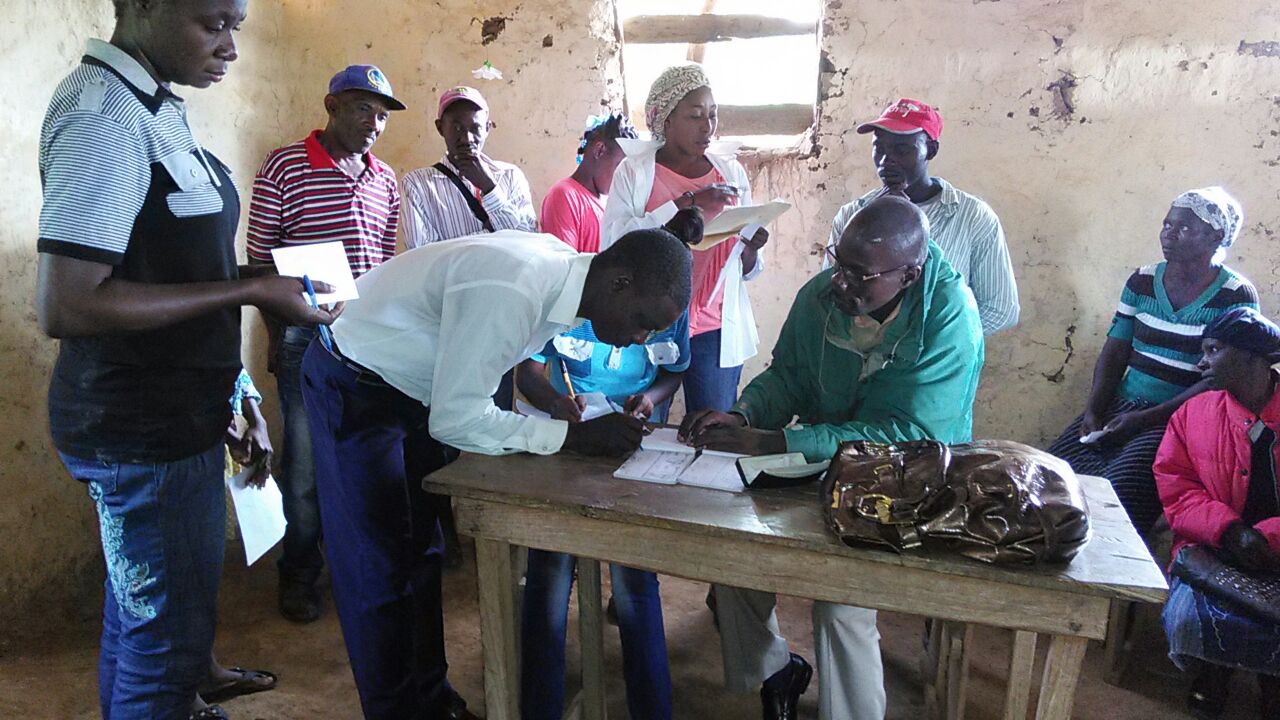As a new Haitian government tries to get its footing and stem violence in Port au Prince, most Haitians outside the capitol are focused on feeding and protecting…
Three keys to progress in Haiti
Faith in Action International and the People’s Organization for the Development of Haiti released a new document describing how grassroots organizing in Haiti, a powerful Haitian diaspora voice, and changes to U.S. Haiti policy can combine to make progress possible in Haiti. Download Three Critical Ingredients for a Way Forward in Haiti.
Despite daunting challenges, ordinary Haitians are working across Haiti to improve their communities and return their country to democracy and development. Haiti’s capital, Port-au-Prince, is being ravaged by gangs in collusion with powerful politicians and business elites. However, it is important to also remember that the vast majority of Haitians live outside Port-au-Prince.
Haitians in Port-au-Prince and across Haiti need solidarity and support from their neighbors, not pity or paternalism. Positive change hinges on three interconnected tasks: support for the country’s strong civil society, raising the voice of the diaspora, and change in U.S. Haiti policy.
1. Strong and growing grassroots organizing in Haiti
Haiti’s greatest resource is its people and their persistent history of organizing. Haiti has some of the highest levels of civic engagement. Robust participation is built into Haiti’s constitution and its economy. Yet, too often, USAID and other development agencies bypass local organizations. Any sustainable, long-term solution to Haiti’s political, economic and climate challenges requires far greater investment in Haiti community-based organizations that can rebuild democracy from the ground up.
Bottom-up community-led change
The People’s Organization for the Development of Northeast Haiti (OPODNE) is an example of the power of grassroots organizing in Haiti. OPODNE is an umbrella for 56 grassroots teams that meet weekly to listen to their neighbors, vote on community priorities, and take action to rebuild roads, clean wells, and start cooperatives and micro-loan programs. OPODNE doubled the number of communities it works with over the past year and opened a new chapter in the North Department.
Strengthening local democracy in Haiti
In the summer of 2022, 1,492 people voted in elections to select presidents and board members for each of the community organizations that made up OPODNE. In a country where the ruling party has repeatedly canceled
elections and ruled by decree, OPODNE is demonstrating democracy and accountability from the bottom up.
Economic survival
In 2022, OPODNE leaders generated $166,023 in income through co-ops and micro-loan programs. OPODNE leaders cooperate to breed goats, grow peppers, purchase and re-sell household goods, and farm together through the Haitian Kombit working together system. OPODNE leaders also operate 12 mutual solidarity funds that make small loans to residents for school fees, farming tools, and other necessities. OPODNE estimates that its mutual economic activities provided employment to 957 people.
OPODNE Capotille Creates a Fish Farm to Generate Income and Food
With $2,000 in support from Solidarite Frontalière Justice aux Migrants (SJM), Konbit Volonte pou Devlopman Capotille completed the first two tanks for a new fish farm in April 2023. They began harvesting and selling fish on Holy Thursday. They plan three more tanks.
Restoring the Capacity of Haitians to Feed Themselves
Over five million Haitians are hungry because they cannot afford imported food, while land stays fallow. In spring 2022, OPODNE surveyed 4,400 local farmers, who said their most pressing issues were drought and the inability to obtain high-quality seeds, fertilizers, and tools to make the land worthwhile to cultivate. In August 2022, 300 OPODNE leaders gathered
with more than a dozen local mayors and clergy to launch a campaign called: LET’S PLANT TODAY SO WE CAN FEED OURSELVES TOMORROW. The goal is to restore the capacity of Haitians to feed themselves by better supporting small-scale farmers.
A New Northeast Haiti Community Seed Bank Brings Hope to Small-Scale Farmers
In May 2023, OPODNE and the Centre d’Agriculture Saint Barnabas (CASB) launched a Community Seed Bank to provide farmers in Northeast Haiti with high-quality, affordable seeds. OPODNE and CASB began a pilot project with $17,000 in donations to lend seeds to farmers in four communities for the spring planting season. They submitted a proposal to USAID to support the Seed Bank to serve more farmers. When the Seed Bank is up and running, farmers will be able to borrow seeds and return more seeds after their harvest. OPODNE and CASB agronomists will work with farmers to determine which seeds are best to plant, given continuing drought conditions.
2. Building a powerful Haitian Diaspora Voice
More than one million Haitian Americans represent an indispensable power bloc for advancing democracy and sustainable development in Haiti. Every year, Haitians living in the U.S, Canada and other countries send more than $3b in remittances to family members, roughly one-quarter of the Haitian GDP. Haitian faith communities in the U.S. support many community improvement efforts in Haiti, and are a vital constituency to change U.S. Haiti policy.
Since 2021, Faith in Action International has been working to strengthen the voice of Haitian diaspora communities in the U.S. and build strong bridges between grassroots organizing in Haiti and in the U.S. Through A Way Forward in Haiti, we hold monthly meetings with U.S. officials, Members of Congress, and allies, and work with Faith in Action affiliates in Massachusetts, New York, New Jersey and Florida to strengthen ties between Haitian faith leaders and communities on the East Coast and across the U.S. In 2021, diaspora pressure played an important role in supporting successful COVID prevention efforts in Haiti and pushing the Biden Administration to send vaccines to Haiti.
3. Changing U.S. Haiti Policy
U.S. foreign, development, and economic policies have a profound impact on the well-being of Haitian children and families. For too long, the U.S. has backed elites who’ve canceled elections and engaged in widespread corruption. And the U.S. has crowded out locally-led organizations by allocating 96.3 percent of USAID assistance to international for-profit contractors and NGOs.
Through A Way Forward in Haiti, Faith in Action International and OPODNE are working with allies, including the National Haitian American Elected Officials Network (NHAEON), Haitian Apostolate, House Haiti Caucus, and Institute for Justice and Development in Haiti to ground U.S. Haiti policies in the experience and wisdom of Haitian civil society leaders.
We’ve pressed for better treatment of Haitian migrants and refugees, support for a civil society-led transition in Haiti, and changing U.S. development policy to channel aid through local organizations rather than foreign contractors.
A key focus of our efforts is to persuade USAID to make local Haitian farmers a bigger part of the agency’s response to rising hunger. While USAID has more than $100m in agricultural projects in North and Northeast Haiti, managed by foreign contractors and NGOs, very little funding is allocated to the key inputs of irrigation, seeds, and tools that local farmers say they need to plant successfully. We’re working to change that, so Haitian farmers can adapt to climate change and restore their capacity to feed their country.
Download Three Critical Ingredients for a Way Forward in Haiti.
Donate to support OPODNE’s grassroots organizing in Haiti.
Take action: Add your name to the campaign to press USAID to support local Haitian farmers.




